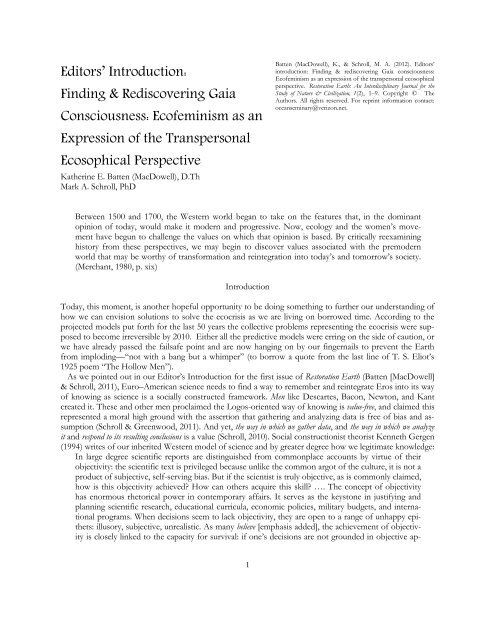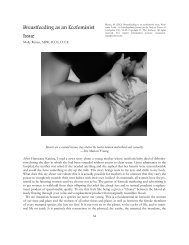RE:IJSNC, Issue 1, Volume 2, May 2012 - Ocean Seminary College
RE:IJSNC, Issue 1, Volume 2, May 2012 - Ocean Seminary College
RE:IJSNC, Issue 1, Volume 2, May 2012 - Ocean Seminary College
Create successful ePaper yourself
Turn your PDF publications into a flip-book with our unique Google optimized e-Paper software.
Editors’ Introduction:<br />
Finding & Rediscovering Gaia<br />
Consciousness: Ecofeminism as an<br />
Expression of the Transpersonal<br />
Ecosophical Perspective<br />
Katherine E. Batten (MacDowell), D.Th<br />
Mark A. Schroll, PhD<br />
Between 1500 and 1700, the Western world began to take on the features that, in the dominant<br />
opinion of today, would make it modern and progressive. Now, ecology and the women’s movement<br />
have begun to challenge the values on which that opinion is based. By critically reexamining<br />
history from these perspectives, we may begin to discover values associated with the premodern<br />
world that may be worthy of transformation and reintegration into today’s and tomorrow’s society.<br />
(Merchant, 1980, p. xix)<br />
Introduction<br />
Today, this moment, is another hopeful opportunity to be doing something to further our understanding of<br />
how we can envision solutions to solve the ecocrisis as we are living on borrowed time. According to the<br />
projected models put forth for the last 50 years the collective problems representing the ecocrisis were supposed<br />
to become irreversible by 2010. Either all the predictive models were erring on the side of caution, or<br />
we have already passed the failsafe point and are now hanging on by our fingernails to prevent the Earth<br />
from imploding—“not with a bang but a whimper” (to borrow a quote from the last line of T. S. Eliot’s<br />
1925 poem “The Hollow Men”).<br />
As we pointed out in our Editor’s Introduction for the first issue of Restoration Earth (Batten [MacDowell]<br />
& Schroll, 2011), Euro–American science needs to find a way to remember and reintegrate Eros into its way<br />
of knowing as science is a socially constructed framework. Men like Descartes, Bacon, Newton, and Kant<br />
created it. These and other men proclaimed the Logos-oriented way of knowing is value-free, and claimed this<br />
represented a moral high ground with the assertion that gathering and analyzing data is free of bias and assumption<br />
(Schroll & Greenwood, 2011). And yet, the way in which we gather data, and the way in which we analyze<br />
it and respond to its resulting conclusions is a value (Schroll, 2010). Social constructionist theorist Kenneth Gergen<br />
(1994) writes of our inherited Western model of science and by greater degree how we legitimate knowledge:<br />
In large degree scientific reports are distinguished from commonplace accounts by virtue of their<br />
objectivity: the scientific text is privileged because unlike the common argot of the culture, it is not a<br />
product of subjective, self-serving bias. But if the scientist is truly objective, as is commonly claimed,<br />
how is this objectivity achieved? How can others acquire this skill? …. The concept of objectivity<br />
has enormous rhetorical power in contemporary affairs. It serves as the keystone in justifying and<br />
planning scientific research, educational curricula, economic policies, military budgets, and international<br />
programs. When decisions seem to lack objectivity, they are open to a range of unhappy epithets:<br />
illusory, subjective, unrealistic. As many believe [emphasis added], the achievement of objectivity<br />
is closely linked to the capacity for survival: if one’s decisions are not grounded in objective ap-<br />
1<br />
Batten (MacDowell), K., & Schroll, M. A. (<strong>2012</strong>). Editors’<br />
introduction: Finding & rediscovering Gaia consciousness:<br />
Ecofeminism as an expression of the transpersonal ecosophical<br />
perspective. Restoration Earth: An Interdisciplinary Journal for the<br />
Study of Nature & Civilization, 1(2), 1–9. Copyright © The<br />
Authors. All rights reserved. For reprint information contact:<br />
oceanseminary@verizon.net.



